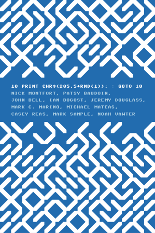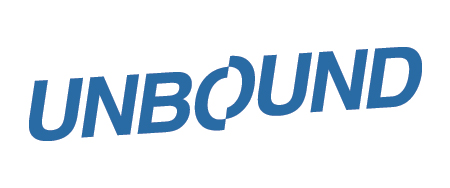Those who have recently started developing electronic literature are welcomed to apply to have work in the Gallery of E-Literature First Encounters. Feb 15 is the deadline; the gallery will be at the “Hold the Light” conference, ELO 2014, in Milwaukee.
Upcoming Events at USC, UCLA, MIT, NYU
The Trope Tank has a good deal going on in the next month, as classes at MIT begin. If you’re in LA, the Boston Area, or New York at the right times, please join us…
– January 16 in Los Angeles at USC, my talk “Computational Poetic Models,” SCA Complex, SCI Room 108, 11am
– January 17 in Los Angeles at UCLA, my talk “Ten Cases of Computational Poetics,” M/ELT, YRL Hub, 12pm
– January 21 in Cambridge at MIT, Dr. Piotr Marecki’s talk “Polish Literature in the Digital Age,” 6pm, The Trope Tank
– January 29 in Cambridge at MIT, Commodore 64 BASIC Workshop, The Trope Tank, 2pm-5pm; the workshop is full but we will try to accommodate spectators when we run/screen the results around 4:30pm
– February 13 in New York at NYU, my talk “Poetic Computing,” 239 Greene St Floor 8, 6pm
Submit to E-Poetry!
The deadline for E-Poetry 2013 (to take place in London, at Kingston University) is almost here – sumissions are due December 1. The festival will take place June 17-20.
10 PRINT Reading / Release Party
Our first event for 10 PRINT is scheduled for:
Monday
November 12, 2012
7pm
at the
Harvard Book Store
1256 Massachusetts Ave.
Cambridge, MA.
This means, of course, that the book will be printed and available for sale by then, which is less than a month from now.
The Harvard Book Store is an independent book store in Harvard Square, founded in 1932.
Of the ten authors of 10 PRINT, we’re planning to have at least me (Nick Montfort), Patsy Baudoin, and Noah Vawter there for some reading from the book, comments on the titular program and the writing of the book, and discussion. The reading is free and takes place at the bookstore itself, as the page on the event explains.
Deus Ex Machina 2
Mel Croucher created an amazing computer game in 1984: Deus Ex Machina, a ZX Spectrum game that takes the player on an abstract journey through different stages of life in segments of fixed duration; it was sold with an audiotape that provided a synchronized soundtrack. The game is unrelated to the later and more famous Deus Ex. It was ported to the Commodore 64 and the MSX.
Croucher, who has been a writer on computing and was also apparently the first person to broadcast computer games over the radio as digital data, is now developing Deus Ex Machina 2, which will star You (Time’s 2006 Person of the Year) and Sir Christopher Lee.
Christian Bök in Purple Blurb *Thursday* 6pm
Update: Thanks to Francisco Ricardo, a video of some of Christian’s Purple Blurb reading is now online.
The Spring 2012 Purple Blurb series comes to an end this week, not with a whimper, but with Christian Bök!
Thursday May 3
6-120
6pm
Christian Bök is the author of Crystallography (Coach House Press, 1994),
a pataphysical encyclopedia nominated for the Gerald Lampert Memorial
Award, and of Eunoia (Coach House Books, 2001), a bestselling work of
experimental literature, which has gone on to win the Griffin Prize for
Poetic Excellence. Bök has created artificial languages for two
television shows: Gene Roddenberry’s Earth: Final Conflict and Peter
Benchley’s Amazon. Bök has also earned many accolades for his virtuoso
performances of sound poetry (particularly the Ursonate by Kurt
Schwitters). His conceptual artworks (which include books built out of
Rubik’s cubes and Lego bricks) have appeared at the Marianne Boesky
Gallery in New York City as part of the exhibit Poetry Plastique. Bök is
currently a Professor of English at the University of Calgary.
If you’re in the Boston area, and interested in radical play with language (why else would you have found this blog?) please come by.
Star Wars, Raw? Rats!
Un file de Machine Libertine:
Star Wars, Raw? Rats!
… is a videopoem by Natali Fedorova and Taras Mashtalir. The text is a palindrome by Nick Montfort that briefly retells “Star Wars Episode IV: A New Hope,” making Han Solo central. The soundtrack is a remix of Commodore 64 music by Sven Schlünzen & Jörg Rosenstiel made by Mashtalir.
The palindrome is a revised version of the one Montfort wrote in 75 minutes for the First World Palindrome Championship, held in Brooklyn on March 16, 2012:
Wow, sagas!
Solo’s deed, civic deed.
Eye dewed, a doom-mood.
A pop …
Sis sees redder rotator.
Radar eye sees racecar X.
Dad did rotor gig.
Level sees reviver!
Solo’s deified!
Solo’s reviver sees level …
Gig rotor did dad!
X, racecar, sees eye.
Radar rotator, redder, sees sis …
Pop a doom-mood!
A dewed eye.
Deed, civic deed.
Solo’s sagas: wow.
Machine Libertine: http://machinelibertine.wordpress.com/
The big-screen premiere of Star Wars, Raw? Rats! will be at MIT in room 32-155 on Monday, April 30, 2012. The screening, which includes a set of films made by members of the MIT community, will begin at 6pm.
Borsuk, Bök, Montfort – May 5, 7pm, Lorem Ipsum
I’m reading soon with our Canadian guest Christian Bök and with my MIT colleague Amaranth Borsuk, who will present _Between Page and Screen_ (published by Siglio Press this year). The gig is at:
Lorem Ipsum Books
1299 Cambridge Street
Inman Square
Cambridge, MA
Ph: 617-497-7669
May 7, 2012 at 7pm
Amaranth Borsuk is the author of _Handiwork_ (2012), the chapbook _Tonal Saw_ (2010), and a collaborative work _Excess Exhibit_ to be released as both a limited-edition book and iPad application in 2012. Her poems, essays, and translations have been published widely in journals such as the _New American Writing, Los Angeles Review, Denver Quarterly, FIELD, and Columbia Poetry Review._ She has a Ph.D. in Literature and Creative Writing from USC and is currently a Mellon Postdoctoral Fellow in Comparative Media Studies, Writing and Humanistic Studies at MIT where she works on and teaches digital poetry, visual poetry, and creative writing workshops.
Christian Bök is the author of _Crystallography_ (2003), a pataphysical encyclopedia, and of _Eunoia_ (2009), a bestselling work of experimental literature. Bök has created artificial languages for two television shows: Gene Roddenberry’s _Earth: Final Conflict_ and Peter Benchley’s _Amazon._ Bök has also earned accolades for his virtuoso performances of sound poetry (particularly _Die Ursonate_ by Kurt Schwitters). Currently, he is conducting a conceptual experiment called _The Xenotext_ (which involves genetically engineering a bacterium so that it might become not only an archive for storing a poem in its genome for eternity, but also a machine for writing a poem as a protein in response). He teaches English at the University of Calgary.
Nick Montfort writes computational and constrained poetry, develops computer games, and is a critic, theorist, and scholar of computational art and media. He teaches at MIT and is currently serving as president of the Electronic Literature Organization. His digital media writing projects include the interactive fiction system Curveship; the group blog _Grand Text Auto;_ _Ream,_ a 500-page poem written on one day; _2002: A Palindrome Story,_ the longest literary palindrome (according the Oulipo), written with William Gillespie; _Implementation,_ a novel on stickers written with Scott Rettberg; and several works of interactive fiction: _Winchester’s Nightmare, Ad Verbum,_ and _Book and Volume._ His latest book, _Riddle & Bind_ (2010), contains literary riddles and constrained poems.
1st Annual World Palindrome Championship
It’s this Friday in Brooklyn, and I’ll be one of six competitors.
This Friday night I’ll be competing in the First Annual World Palindrome Championship. If you insist, you can call it the First or the Inaugural World Palindrome Championship, but that’s the name of the event.
Er, Eh – Where?
The event will take place in Brooklyn at the New York Marriott at the Brooklyn Bridge. The competition, with a 75-minute time for palindrome composition based on a prompt, will kick off the 35th Annual American Crossword Puzzle Tournament and will start at 8pm. (Those cruciverbalists like to stay up late.) It’s all run by Will Shortz, crossword puzzle editor for The New York Times. The championship is the first thing on the tournament schedule.
Name no one man!
Actually, one man is almost sure to be named. The five competitors already selected are Jon Agee, Martin Clear, John Connett, humble narrator Nick Montfort, and Mark Saltveit. Jon Agee has authored books of cartoons illustrating palindromes, including Palindromania! Martin Clear penned “Trade life defiled art” and is making a trip from Australia for the event. John Connett is a fellow academic whose wonderful palindromic quips include “Epic Erma has a ham recipe.” Mark Saltveit is a stand-up comedian and found and editor of The Palindromist, the only magazine specific to this form that I know. And I suppose I got into this by writing the 2002-word palindrome 2002: A Palindrome Story with William Gillespie. The whole list, with pictures and further links, is up on Saltveit’s page for the event.
A competitor will be selected from the audience on Friday based on a palindrome written and submitted that day. If this is a woman or a pair of identical twin collaborators, there is some chance that no one man will be named. Unless one of these miraculously appears and is selected, though, we will unfortunately miss the company of my collaborator William, Mike Maguire (author of Drawn Inward and Other Poems), Demetri Martin, Harry Mathews, and many other top practitioners of the art. For a first gathering of palindrome-writers, though, who can complain?
Purple Blurb is Shaped Like Canada
We have an amazing Spring 2012 Purple Blurb lineup, thanks to this academic year’s organizer, Amaranth Borsuk, and featuring two special events and readings by two leading Canadian poets who work in sound, concrete, and conceptual poetry. The Purple Blurb series is supported by the Angus N. MacDonald fund and MIT’s Program in Writing and Humanistic Studies. All events are at MIT and are free and open to the public.
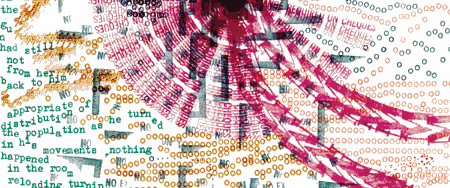
Monday, March 19
5:30 PM
6-120
Steve McCaffery
Author of Carnival, The Black Debt, Seven Pages Missing
Professor and David Gray Chair of Poetry and Letters, SUNY Buffalo
A central figure in Canadian avant-garde writing, Steve McCaffery’s work
spans sound poetry, generative and iterative text, experimental prose,
performance art, literary criticism, and visual poetics. A member of the
Four Horsemen sound poetry ensemble and a professor of English at SUNY
Buffalo, he is the author of over a dozen influential books of poetry,
twenty chapbooks and four volumes of critical writing. His works include
CARNIVAL panels 1 and 2, Panopticon, The Black Debt, North of Intention
and Rational Geomancy: Kids of the Book-Machine (with bpNichol). With Jed
Rasula, McCaffery edited Imagining Language, an anthology for MIT Press.
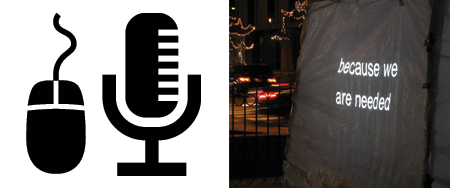
Monday, April 9
5:30 PM
6-120
Open Mouse / Open Mic
Featuring Alexandra Chasin, Ari Kalinowski, and YOU
Please join us for an open mic featuring D1G1T4L WR1T1NG for a variety of
platforms, from immersive projections by Ari Kalinowski to generative
fiction for the iPad by Alexandra Chasin.
Bring video art, interactive fiction, SMS poems, hypertext fiction and poetry, text generators, and any form of electronic literature you’ve got up your sleeve! This event is co-sponsored by the Electronic Literature Organization.
Alexandra Chasin is the author of Kissed By (FC2), and Selling Out: The Gay
and Lesbian Movement Goes to Market (St. Martin’s). She teaches Writing at
Lang College, The New School. Ari Kalinowski runs the Intermedia Poetry
Project.
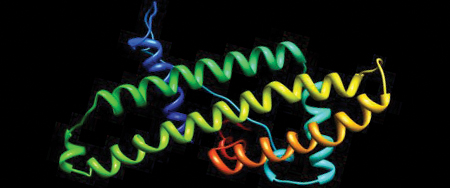
Thursday, May 3
6:00 PM
6-120
Christian Bök
Professor of English, University of Calgary
Co-sponsored by the Visiting Artist Series and WHS
Author of Crystallography, Eunoia and The Xenotext.
Christian Bök is the author of Crystallography (Coach House Press, 1994),
nominated for the Gerald Lampert Award for Best Poetic Debut, and Eunoia, a
lipogram that uses only one vowel in each chapter, which won the 2002
Griffin Poetry Prize and is the best-selling Canadian poetry book of all
time. He is also author of Pataphysics: The Poetics of an Imaginary Science
(2001). His latest project, The Xenotext, encodes a poetic text into
bacterial DNA that will produce proteins in response—yielding another poetic
text. Bök has created artificial languages for Gene Roddenberry’s Earth:
Final Conflict and Peter Benchley’s Amazon.
1:00 PM – 7:00 PM
Bartos Theater
Friday, May 4
Unbound: Speculations on the Future of the Book
Co-sponsored by the Mellon Foundation, SHASS, WHS, the Arts at MIT Visiting
Artist Program, and the MIT Communications Forum
An afternoon of discussion with theorists and practitioners from MIT and
beyond who are concerned with the shape of books to come.
Participants include:
Christian Bök (University of Calgary)
Katherine Hayles (Duke University)
Bonnie Mak (University of Illinois at Urbana-Champaign)
Rita Raley (UC Santa Barbara)
James Reid-Cunningham (Boston Athenaeum)
Bob Stein (Institute for the Future of the Book)
Codings
Codings shows the computer as an aesthetic, programmed device that computes on characters. The works in the show continue and divert the traditions of concrete poetry and short-form recreational programming; they eschew elaborate multimedia combinations and the use of network resources and instead operate on encoded letters, numbers, punctuation, and other symbols that are on the computer itself.
////////////////////////// Giselle Biguelman
///////////////////////// Commodore Business Machines, Inc.
//////////////////////// Adam Parrish
/////////////////////// Jörg Piringer
////////////////////// Casey Reas
///////////////////// Páll Thayer
Curated by Nick Montfort
Pace Digital Gallery
Feb 28th – March 30th, 2012 (with regular gallery hours Mon-Thu 12-5pm).
Panel with artists Adam Parrish and Páll Thayer and the curator, and opening reception, Feb 28th, 5-7pm.
The Codings catalog is available as a PDF for download (6MB).
The Pace Digital Gallery is directed by Frank T. Marchese and Jillian Mcdonald and is located at 163 William St, New York, NY. More information on the works exhibited, and directions to the gallery, can be found at the Pace Digital Gallery site.
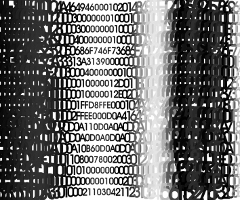
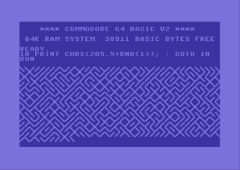
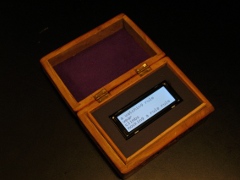

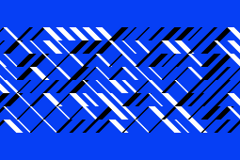
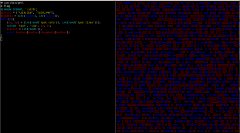
“Electrifying Literature” Deadline
An exhortation for those creating or researching electronic literature to please submit to Electrifying Literature: Affordances and Constraints, the 2012 Electronic Literature Organization conference. The gathering will take place June 20-23, 2012 in Morgantown, West Virginia. A juried Media Arts Gallery Exhibit will be held from Wednesday, June 13 through Saturday, June 23, 2012 at The Monongalia Arts Center. Registration costs have been kept down to make it easier for writers and artists who don’t have institutional travel support to be part of the event.
The deadline for abstracts & proposals is November 30, by the way.
Electrifying Literature: The ELO 2012 Conference at WVU
Call for Proposals…
ELO 2012
Electrifying Literature
Affordances and Constraints
June 20-23, 2012
Morgantown, WV
Conference Planning Committee
– Sandy Baldwin, West Virginia University (Chair)
– Philippe Bootz, University of Paris 8
– Dene Grigar, Washington State University Vancouver
– Margie Luesebrink, Irvine Valley College
– Mark Marino, University of Southern California
– Stuart Moulthrop, University of Wisconsin, Milwaukee
– Joseph Tabbi, University of Illinois, Chicago
We invite titles and proposals of no more than 500 words, including a brief description of the content and format of the presentation, and contact information for the presenter(s). Send proposals to elit2012 [at] gmail.com, using plain text format in the email, or attached as Word or PDF. All proposals will receive peer-to-peer review by the ELO and will be considered on their own terms. Non-traditional and traditional formats will be subject to the same peer-to-peer review process.
Submission deadline for proposals: November 30, 2011
Notification of acceptance: December 30, 2011
Electronic Literature: Where is It?*
The 2012 Electronic Literature Organization Conference will be held June 20-23, 2012 in Morgantown, WV, the site of West Virginia University. In conjunction with the three-day conference, there will be a juried Media Arts Show open to the public at the Monongalia Arts Center in Morgantown and running from June 18-30, 2012. An accompanying online exhibit will bring works from the ELO Conference to a wider audience.
Even if nobody could define print literature, everyone knew where to look for it – in libraries and bookshops, at readings, in class, or on the Masterpiece channel. We have not yet created, however, a consensus about where to find electronic literature, or (for that matter) the location of the literary in an emerging digital aesthetic.
Though we do have, in digital media, works that identify themselves as “locative,” we don’t really know where to look for e-lit, how it should be tagged and distributed, and whether or how it should be taught. Is born digital writing likely to reside, for example, in conventional literature programs? in Rhetoric? Comp? Creative Writing? Can new media literature be remediated? How should its conditions of creation be described? Do those descriptions become our primary texts when the works themselves become unavailable through technological obsolescence?
To forward our thinking about the institutional and technological location of current literary writing, The Electronic Literature Organization and West Virginia University’s Center for Literary Computing invite submissions to the ELO 2012 Conference to be held from June 20-23, 2012, in Morgantown, West Virginia.
Bearing in mind the changing locations of new media literature and literary cultures, the conference organizers welcome unconventional presentations, whether in print or digital media. The point is not to reject the conventional conference ‘paper’ or bullet point presentation but to encourage thoughtful exploration and justification of any format employed. All elements of literary description and presentation are up for reconsideration. The modest mechanisms of course descriptions, syllabus construction, genre identification, and the composition of author bios, could well offer maps toward the location of the literary in digital media. So can an annotated bibliography of works falling under a given genre or within a certain technological context. We welcome surveys of the use of tags and keywords, and how these can be recognized (or not) by readers, libraries, or other necessary nodes in an emerging literary network Also of interest is the current proliferation of directories of electronic literature in multiple media, languages, and geographical locations.
The cost of the conference is $150; graduate students and non-affiliated artists pay only $100. The cost covers receptions, meals, and other conference events. All participants must be members of the Electronic Literature Organization. All events are within walking distance of the conference hotels. Morgantown is a classic college town, located in the scenic hills of north central West Virginia, about 70 miles south of Pittsburgh, PA. Local hotel and travel information will be available on the conference website starting October 1, 2011.
Check http://el.eliterature.org and http://conference.eliterature.org for updates. For more information, email elit2012 [at] gmail.com.
*Note: this title derives from an essay by ELO Board Member Dene Grigar in electronic book review, where selected conference presentations will be published within a few months of the conference.
¡Viva ICCC-11!
The Second International Conference on Computational Creativity (ICCC-11) in Mexico City was a great success, thanks in large part to local organizer Rafael Pérez y Pérez and to the support of UAM and UNAM Posgrado.
If you’re interested in computational models of creativity, please take a look at the proceedings. It was announced in Mexico City that the next ICCC will take place in 2012 at University College Dublin. We hope you’ll look forward to joining us there. And from year to year, computationalcreativity.net will keep you informed about conferences in the series.
Creativity and Cognition Deadline – Soon!
As the call for papers for ACM Creativity and Cognition explains, we’re only two weeks away from the deadline. Papers, artworks, and proposals for tutorials and workshops are all welcome!
Keynote, Papers Announced for ICCC-11
The 2011 International Conference on Computational Creativity will be held in Mexico City April 27-29. We now have information on the keynote address by Prof. George E. Lewis, “Improvising With Creative Machines: Reflections on Human-Machine Interaction.” And, there’s a list of accepted papers and demos. I’m looking forward to seeing those of you who are presenting at the end of April in Mexico City. And if any others with an interest in the field can make it to the gathering and be part of the discussion, attend the presentations, and learn about systems through demos, please do!
March 15 in Philadelphia: OuLiPoLooZa
[An announcement from Penn’s Kelly Writers House:]
We’re pulling out all the constraints for our OULIPOLOOZA next Tuesday,
March 15, at 7:00 pm. Organized by our own Sarah Arkebauer (C’11) and
Michelle Taransky, this celebration of all things Oulipo will feature five
experts and aficionados talking about the “Ouvroir de littérature
potentielle,” the highly-influential French school of avant garde poetry.
The evening will be rounded out by the launching “An Oulipolooza,” a
collection of new Oulipian writing, and a constraint-inspired reception.
This is one celebration you should not A Void!
The Kelly Writers House presents
OULIPOLOOZA
a celebration of potential literature
featuring
KATIE PRICE
LOUIS BURY
JEAN-MICHEL RABATÉ
GERALD PRINCE
and NICK MONTFORT
Tuesday, March 15, at 7:00 PM in the Arts Café
Kelly Writers House | 3805 Locust Walk, Philadelphia, PA
No registration required – this event is free & open to the public
Come help us celebrate the continuing potential of literatures by attending
the OULIPOLOOZA, a Kelly Writers House-style celebration of all things
Oulipo. The OuLiPo, or “Ouvroir de littérature potentielle” (workshop of
potential literature), is a group of experimental French poets founded in
1960, devoted to exploring the potential of literature, language and freedom
through the lenses of different constraints. Oulipolooza will include
readings about the Oulipo by five experts and aficionados, a reception full
of Oulipo-inspired foods, and the launch of “An Oulipolooza”: a collection
of oulipian texts.
KATIE L. PRICE is a Ph.D. candidate in the University of Pennsylvania’s
English Department completing her dissertation, tentatively titled “‘The
Tangential Point’: Pataphysical Practice in Post-War Poetry.” She is also an
associate editor for Electronic Poetry Center, co-coordinator of the Poetry
& Poetics graduate group, and will teach a course in the fall entitled
Poetry, Technology, Gender and Globalization.
LOUIS BURY teaches literature at New York University, is a part-time
professional poker player, and is completing a constraint-based dissertation
about constraint-based writing, titled Exercises in Criticism, at the
Graduate Center of the City University of New York.
JEAN-MICHEL RABATÉ is Vartan Gregorian Professor in the Humanities at the
University of Pennsylvania. Co-founder and curator of Slought Foundation,
he is a senior editor of the Journal of Modern Literature. A fellow of the
American Academy of Arts and Sciences, he has authored or edited more than
thirty books on modernism, psychoanalysis, contemporary art and philosophy.
Recent titles include Lacan Literario (2007), 1913: The cradle of modernism
(2007), The Ethic of the Lie (2008) and Etant donnes: 1) l’art, 2) le
crime (2010). Currently, he is editing a collection of essays on Modernism
and Theory. He is the president of the Samuel Beckett Society and completing
a book on Samuel Beckett and philosophy.
GERALD PRINCE is Professor of Romance Languages and Head of the French
section at the University of Pennsylvania. He is the author of many articles
and reviews on narrative theory and on modern (French) literature as well as
of several books (including A Dictionary of Narratology and Guide du roman
de langue française: 1901-1950) and his work has been translated into a
dozen languages. A co-editor of the “Stages” series for the University of
Nebraska Press and a member of a dozen editorial and advisory boards, Prince
is working on the second volume of his Guide du roman (1951-2000).
NICK MONTFORT writes computational and constrained poetry, develops computer
games, and is a critic, theorist, and scholar of computational art and
media. He is associate professor of digital media in the Program in Writing
and Humanistic Studies at the Massachusetts Institute of Technology, and is
now serving as president of the Electronic Literature Organization. He
earned a Ph.D. in computer and information science from the University of
Pennsylvania.


